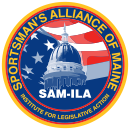Testimony in Support
LD 1271, An Act Regarding the Certification Process for Direct Initiatives and People’s Veto Referenda
LD 1323, An Act to Amend the Direct Initiative Signature Gathering Process.
Before the Joint Standing Committee on Veteran and Legal Affairs
Written by David Trahan, Executive Director, Sportsman’s Alliance of Maine
April 18, 2017
Senator Mason, Representative Luchini, distinguished members of the Veteran and Legal Affairs Committee, my name is David Trahan, Executive Director of the Sportsman’s Alliance of Maine in testifying in Support of LD 1271, An Act Regarding the Certification Process for Direct Initiatives and People’s Veto Referenda and LD 1323, An Act to Amend the Direct Initiative Signature Gathering Process.
I would like to thank Representative Kinney and Representative Luchini for sponsoring legislation that reforms Maine’s initiative process. Although our organization had some input in each of these bills, some of the provisions, particularly in LD 1271, need amending. It is our hope that the committee will take the two bills and combine them in work session and amend the bills in a way the whole committee can support.
Some might ask why this bill is needed; I will answer that question and speak to the sections of each of the bills that are in my opinion a high priority.
First and foremost, no set of laws or rules are worth the paper they are written on without a way to enforce them. Both bills have a provision to establish an on-line reporting system for potential petition violations. Currently, when rules that govern signature collection are violated by petitioners in the field, they are not actionable until petitions are notarized and turned in for certification.
Because certification deadlines are set in stone and investigations can be a lengthy process conducted over months, the likelihood of prosecution is nearly zero. For example, if I complained a person was collecting signatures without witnessing them, I would have to conduct a citizen investigation. It is not a crime to violate the signature collection laws until a circulator swears, under oath, they followed the rules. Even if they have their petition notarized, until they turn it in for certification, they have done nothing wrong.
Documenting fraudulent behavior and tracking this type of investigation is almost impossible and shady circulators know it. The only way to hold circulators accountable is to have a system to report fraudulent activity while it is occurring and then when petitions are turned in for certification, determine whether the fraudulent petitions were sworn and turned in, if they were, it is fraud. An on-line fraud hotline would not bother the honest petitioner, but for those that break the rules, they will always wonder whether their dishonest activity was caught on camera. What better deterrent?
Second, reforming the Notary statutes and building independence into the important function of Notaries is critical to preserving the voter’s rights to petition their government. In the recently passed referendum cycle for instance, the signatures of 76,983 Maine voters were disqualified by the Secretary of State in four different campaigns because of Notary discrepancies:
Casinos-32,526
Marijuana-31,526
K-12 Education-7,519
Background Checks-5,600
Not all Notaries are a problem, but some are. I will put them into two categories. Notaries who notarize occasional legal documents are not a problem. Some notaries that participate in referendum campaigns and are also paid to organize referendum campaigns are a problem.
At least two Maine signature collection companies and their leaders are paid to organize referendums then use their spouses, relatives and friends, sometimes paid, to notarize petitions on the same referendum they work; in addition, these petition organizers are also notaries that notarize circulator petitions for the hired and volunteer collectors. Although this is not illegal it stinks of conflict of interest and should be.
Notaries are designed to be independent and act as an important accountability function. They serve under the auspices and a function of the Secretary of State; consequently, the Notaries integrity should appear beyond reproach. Subsection 903-D, section B. and D. of LD 1271 could be amended to ban the hiring of relatives as Notaries in which their significant other is employed. Section B. should be amended to read “petition”, instead of paid by signature, that was the original intent when the bill was drafted.
Also, campaign organizers should be banned from notarizing petitions on the campaigns they work.
Finally, if the suggested changes to LD 1271 are adopted by the committee, I don’t think section 2 related to seals and identifying numbers is needed. I also encourage you to adjust the current Notary fees to pay for any fiscal note that may be attached to the bill to pay for the on-line reporting hotline. If it is the will of the committee I will work with the sponsors of these two bills to prepare an amendment for work session. We support all of the changes proposed in LD 1323.
